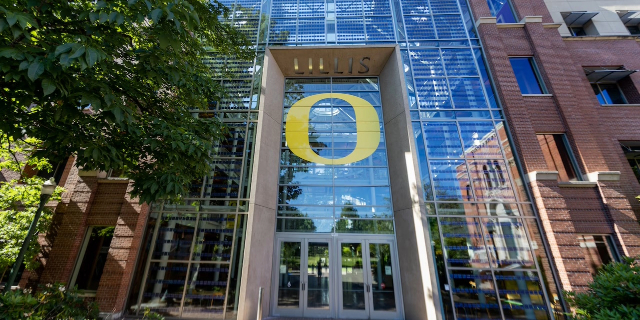‘Extremely rare’: Sudden revocation of University of Oregon student’s visa sparks alarm
Published 12:50 pm Monday, April 7, 2025

- Lillis Business Complex on the campus of University of Oregon in Eugene, Oregon, taken in June 2022. Sean Meagher/The Oregonian
Federal officials terminated a University of Oregon student visa on March 28 — raising alarm bells just as the Eugene campus was returning to life on the last day of spring break.
On Friday, a university spokesperson described visa revocations as “extremely rare,” while student activists said they had raised more than $10,000 for the student’s legal aid fund.
As it stands, the international student now has until the end of next week to leave the country or find a legal pathway to remain.
Trending
UO officials have declined to identify the student or provide details about their age or country of origin, citing student privacy laws.
With the situation in flux, here are five things to know about the case:
What is a student visa?
A student visa is simply a license issued by the U.S. government allowing a foreigner to come here to study. Hundreds of thousands of student visas are issued each year.
The University of Oregon is hosting 815 international students this year, according to UO spokesperson Eric Howald. Most have F-1 student visas, he said.
Why is this case so rare?
In the past, when a student’s visa was canceled, the students typically were allowed to remain in the U.S. as long as they continued with their studies, according to Inside Higher Education, an online publication.
The student in this case lost not only their visa but also their residency — meaning they must leave the country in two weeks.
Trending
“Our vice provost of global engagement has not seen this happen in his 20 years in his field,” Howald said.
Why did the student lose their residency status?
Officials said the revocation was due to “unspecified criminal charges” — leaving it unclear whether they were arrested recently or if they’ve been convicted of a crime.
The case didn’t occur locally, however, according to Eugene police spokesperson Melinda McLaughlin.
Howald, the university spokesperson, said administrators saw news reports of deported students and began checking the university’s visa database — known as SEVIS — on a daily basis.
When UO officials saw that the international student had lost legal residency, they were required by law to inform the student of the 15-day time limit to leave.
“The University of Oregon did not bring the individual to the attention of federal authorities and was not involved in any decisions regarding their status,” Howald said. “When a student’s visa is revoked, the university offers any assistance we can provide.”
How is the Trump administration involved?
Secretary of State Marco Rubio told reporters March 28 that the State Department had already revoked about 300 visas, primarily those issued to students.
Rubio said some of the international students were pro-Palestinian activists, while others were losing their visa status solely because of criminal charges.
“No one has a right to a visa,” Rubio said, according to a transcript. “We can cancel a student visa under the law just the same way that we can deny a student visa under the law. And we will do so in cases we find appropriate.”
What happens now?
It depends. The student could file an administrative appeal — or a lawsuit. So far, none appear in Oregon federal court records.
Kaleigh Bronson-Cook, a College of Education faculty member at UO, said the fundraising effort will allow the student to seek legal advice, with leftover money to be saved for other students whose visas are targeted.
“It is our responsibility to do everything in our power to stand firm against these injustices and demand more of our institutions,” she said.
A State Department official said the agency will continue to work with the Department of Homeland Security to enforce visa policy.
“The United States has zero tolerance for non-citizens who violate U.S. laws,” the spokesperson said in an unsigned email.







